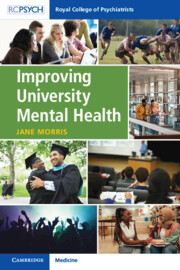Book contents
- Improving University Mental Health
- Improving University Mental Health
- Copyright page
- Contents
- Foreword
- Acknowledgements and Thanks to Contributors
- Chapter 1 Introducing This Handbook
- Chapter 2 Building a New Sense of Belonging
- Chapter 3 The Transition to University for New Students with Pre-Existing Mental Conditions
- Chapter 4 The Roles of Parents and Carers
- Chapter 5 Healthy Bodies, Body Image Concerns, Eating Disorders
- Chapter 6 Alcohol
- Chapter 7 Substance Misuse
- Chapter 8 Social (and Anti-social) Media
- Chapter 9 Finance and Mental Health
- Chapter 10 Neurodiversity
- Chapter 11 Ethnically Diverse University Communities
- Chapter 12 Sexual Behaviour and Gender Identity in Universities
- Chapter 13 The Mental Health of Teaching and Academic Staff
- Chapter 14 An Overview of Mental Disorders in Students and Staff
- Chapter 15 ‘Psychotic’ Disorders
- Chapter 16 Mood Disorders
- Chapter 17 Suicide at University
- Chapter 18 Mental Health Services on Campus and in the NHS
- Chapter 19 Students of the Professions and ‘Fitness to Practise’ Issues
- Chapter 20 Summing It All Up
- Index
- References
Chapter 16 - Mood Disorders
Depression and Anxiety
Published online by Cambridge University Press: 08 February 2024
- Improving University Mental Health
- Improving University Mental Health
- Copyright page
- Contents
- Foreword
- Acknowledgements and Thanks to Contributors
- Chapter 1 Introducing This Handbook
- Chapter 2 Building a New Sense of Belonging
- Chapter 3 The Transition to University for New Students with Pre-Existing Mental Conditions
- Chapter 4 The Roles of Parents and Carers
- Chapter 5 Healthy Bodies, Body Image Concerns, Eating Disorders
- Chapter 6 Alcohol
- Chapter 7 Substance Misuse
- Chapter 8 Social (and Anti-social) Media
- Chapter 9 Finance and Mental Health
- Chapter 10 Neurodiversity
- Chapter 11 Ethnically Diverse University Communities
- Chapter 12 Sexual Behaviour and Gender Identity in Universities
- Chapter 13 The Mental Health of Teaching and Academic Staff
- Chapter 14 An Overview of Mental Disorders in Students and Staff
- Chapter 15 ‘Psychotic’ Disorders
- Chapter 16 Mood Disorders
- Chapter 17 Suicide at University
- Chapter 18 Mental Health Services on Campus and in the NHS
- Chapter 19 Students of the Professions and ‘Fitness to Practise’ Issues
- Chapter 20 Summing It All Up
- Index
- References
Summary
Depressive symptoms may be the observable features of several different mental conditions, which require different treatments. It is particularly important to identify bipolar vulnerability. Alcohol and other recreational drugs can cause or worsen depression and anxiety. Eating disorders can be manifestations of depression or anxiety, but can also bring about these conditions. People with autism may be particularly vulnerable to anxiety disorders. Students suffer from depression and anxiety disorders at around the same rate as the rest of their age group but have unique difficulties accessing treatment. They can benefit from access to psychotherapies alongside medication to enhance benefits. There is a wide range of anxiety disorders, and anxiety is very often present alongside depression. In such cases higher doses of the so-called ‘antidepressant’ drugs are required. Students and staff may have both genetic and environment predispositions to mental disorders. Treatments which have helped a family member may prove most effective. Prescribing for female students and staff should consider safety during any future pregnancy. Students with more severe depression or anxiety disorders require longer therapies than university counselling routinely offers. Discussions with local NHS clinics are needed. Arrangements for treatment during vacations are essential.
Keywords
- Type
- Chapter
- Information
- Improving University Mental Health , pp. 245 - 259Publisher: Cambridge University PressPrint publication year: 2024



